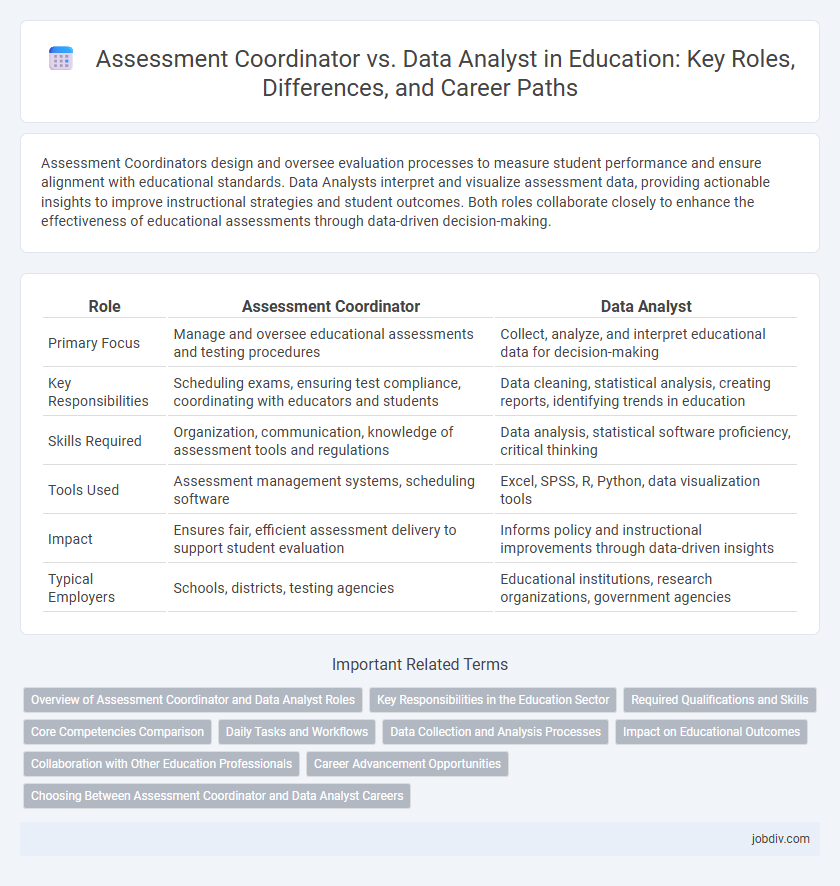Assessment Coordinators design and oversee evaluation processes to measure student performance and ensure alignment with educational standards. Data Analysts interpret and visualize assessment data, providing actionable insights to improve instructional strategies and student outcomes. Both roles collaborate closely to enhance the effectiveness of educational assessments through data-driven decision-making.
Table of Comparison
| Role | Assessment Coordinator | Data Analyst |
|---|---|---|
| Primary Focus | Manage and oversee educational assessments and testing procedures | Collect, analyze, and interpret educational data for decision-making |
| Key Responsibilities | Scheduling exams, ensuring test compliance, coordinating with educators and students | Data cleaning, statistical analysis, creating reports, identifying trends in education |
| Skills Required | Organization, communication, knowledge of assessment tools and regulations | Data analysis, statistical software proficiency, critical thinking |
| Tools Used | Assessment management systems, scheduling software | Excel, SPSS, R, Python, data visualization tools |
| Impact | Ensures fair, efficient assessment delivery to support student evaluation | Informs policy and instructional improvements through data-driven insights |
| Typical Employers | Schools, districts, testing agencies | Educational institutions, research organizations, government agencies |
Overview of Assessment Coordinator and Data Analyst Roles
Assessment Coordinators manage the development, administration, and analysis of educational assessments to ensure alignment with curriculum standards and improve student outcomes. Data Analysts in education focus on collecting, interpreting, and visualizing large datasets to inform decision-making and policy development. Both roles require expertise in data management, but Assessment Coordinators emphasize test coordination and compliance, while Data Analysts prioritize statistical analysis and data-driven insights.
Key Responsibilities in the Education Sector
Assessment Coordinators oversee the development, administration, and reporting of student evaluations to ensure alignment with educational standards and improve instructional outcomes. Data Analysts in education collect, analyze, and interpret student performance data to support evidence-based decision-making and policy formulation. Both roles collaborate to enhance academic achievement by leveraging assessment data and ensuring its accuracy and effective use across educational programs.
Required Qualifications and Skills
Assessment Coordinators require expertise in educational standards, test administration, and compliance with state or federal assessment policies, often holding credentials in education or assessment-related fields. Data Analysts in education demand strong proficiency in statistical software, data visualization, and data interpretation to support decision-making, typically requiring degrees in data science, statistics, or related disciplines. Both roles benefit from excellent communication skills and the ability to collaborate with educators and administrators to optimize student performance outcomes.
Core Competencies Comparison
Assessment Coordinators excel in designing, implementing, and managing educational assessments while ensuring alignment with curriculum standards and compliance with testing protocols. Data Analysts specialize in interpreting and visualizing complex educational data sets, utilizing statistical tools and software to drive data-informed decision-making. Core competencies for Assessment Coordinators emphasize project management and educational measurement, whereas Data Analysts focus on quantitative analysis, data modeling, and reporting expertise.
Daily Tasks and Workflows
Assessment Coordinators manage the administration, scheduling, and compliance of student assessments, ensuring alignment with educational standards and coordinating with teachers and administrators for smooth testing processes. Data Analysts collect, clean, and interpret assessment data, generating actionable reports and visualizations to inform instructional strategies and policy decisions. While Assessment Coordinators focus on operational logistics and stakeholder communication, Data Analysts emphasize statistical analysis and data-driven insights to improve educational outcomes.
Data Collection and Analysis Processes
Assessment Coordinators manage the systematic collection of student performance data, ensuring alignment with educational standards and assessment goals. Data Analysts process and interpret these datasets using statistical tools to identify trends, inform instructional strategies, and support data-driven decision-making. Both roles collaborate to optimize data accuracy, workflow efficiency, and meaningful analysis to enhance educational outcomes.
Impact on Educational Outcomes
Assessment Coordinators design and implement testing procedures that directly evaluate student learning and identify gaps, ensuring targeted instructional improvements. Data Analysts interpret large sets of educational data to reveal trends and patterns that inform policy decisions and resource allocation. Together, their combined efforts enhance instructional strategies and institutional effectiveness, driving measurable improvements in student achievement and overall educational outcomes.
Collaboration with Other Education Professionals
Assessment Coordinators collaborate closely with teachers, administrators, and curriculum specialists to design and implement effective evaluation strategies aligned with educational goals. Data Analysts work alongside school leaders and educators to interpret assessment data, providing actionable insights that inform instructional improvements and policy decisions. Both roles require strong communication and teamwork skills to ensure data-driven approaches enhance student learning outcomes.
Career Advancement Opportunities
Assessment Coordinators gain career advancement by mastering test administration, data collection, and compliance reporting, positioning themselves for roles in educational leadership and program evaluation. Data Analysts in education leverage advanced data modeling, statistical analysis, and visualization skills to support strategic decision-making, opening pathways to senior analytics, policy development, and institutional research roles. Both careers benefit from proficiency in educational data systems such as PowerSchool and Tableau, with continuous professional development accelerating upward mobility in school districts and higher education institutions.
Choosing Between Assessment Coordinator and Data Analyst Careers
Choosing between an Assessment Coordinator and a Data Analyst career in education depends on your expertise and interests in data management and interpretation. Assessment Coordinators specialize in designing, implementing, and analyzing educational assessments to improve student outcomes, while Data Analysts focus on collecting, cleaning, and interpreting large datasets to inform educational policy and strategy. Both roles require strong analytical skills, but Assessment Coordinators emphasize applied educational metrics, whereas Data Analysts prioritize broader data trends and statistical techniques.
Assessment Coordinator vs Data Analyst Infographic

 jobdiv.com
jobdiv.com